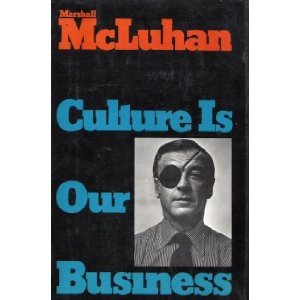
The influence of media/cultural theorist Marshall McLuhan, who died 40 years ago at the age of 69, remains strong. As we continue to grapple for answers about how to approach life in our pandemic era, the work of McLuhan has no easy answers, but does provide us with prompts for creative thought.
In that spirit, I’ve chosen 15 quotes from the 1972 edition of his book Culture is Our Business, which is built around his short observations, and quotations from others, paired with full page print advertisements of the era. The ads (Hertz, Japan Air Lines, Coffee of Brazil, Lockheed, The Wall Street Journal, Sony, Volkswagen, Muzak, and many more) are undoubtedly creative, but also period pieces of another turbulent time, the late sixties/early seventies. The reliance on advertising of much of our economy has only grown since then, and diminishing pandemic-related ad revenues have had drastic effects on newspapers, magazines, websites, and broadcast media.
In the introduction to the 1972 edition (the book was originally published in 1970), McLuhan writes: “The world of the ad is the world of 20th century folk art. That is, the ad is a meeting place of all the arts and all the skills and all the media of the American environment.” And: “Advertising as information has long been supposed to be primarily for the purpose of moving products. It has not been sufficiently noticed that advertising itself is an information commodity far greater than anything that it advertises.”
Note the applicability of the following quotes to today’s upended world of business, employment, media, education, and other spheres:
“All discoveries in art and science result from an accumulation of errors.”
“As an executive climbs up the echelons of the organization chart, his involvement in the organization becomes less and less.”
“Image making succeeds goal matching in a time when the targets change faster than the aims. At present, the day an engineer or a medical student graduates, he is obsolete.”
“In non-visual space both man and animal are hunters.”
“In the age of the information hunter feedback yields to feedforward, the point of view becomes the probe. Problems become discoveries.”
“One of the many flips of our time is that the electric information environment returns man to the condition of the most primitive prober and hunter. Privacy invasion is now one of our biggest knowledge industries.”
“Poets and artists live on frontiers. They have no feedback, only feedforward. They have no identities.”
“The ancient seer was typically figured as blind. He lived by insight.”
“The cave art of Madison Avenue has been by far the most innovative and educative art form of the twentieth century.”
“The fragmented echelons of the organization chart have fused into a common image of group involvement, the new post-literate conglomerate.”
“The higher an executive gets inside any big organization, the sooner he drops out; because he has less and less to do with the operation.”
“The new age of electric software and information involves everybody in a single human family once more.”
“The poet dislocates language into meaning. The artist smashes open the doors of perception.”
“Today, if anyone wishes to head a big organization, he must be “discovered” at the head of a small one. He cannot come up from inside. There are too many fragmented specialisms.”
“Visual space is a continuum. On the other hand (i.e., interval as explanation), acoustic space is a sphere without center or margin.”
I wrote about the connections between McLuhan and Peter Drucker in 2011, the first time I spoke at the Rotman School of Management at the University of Toronto. The University of Toronto was McLuhan’s longtime home, and I was privileged (by coincidence, luck, and timing) to attend a special dinner at the Faculty of Information/iSchool of the University of Toronto, honoring the first McLuhan Centenary Visiting Fellows, marking the 100th anniversary of McLuhan’s birth.
I remain in touch with one of the Fellows I met that night, Paolo Granata, who is now an Assistant Professor in Book and Media Studies at St. Michael’s College in the University of Toronto. Among other things, he is Curator of the McLuhan Salons series. The McLuhan Centre for Culture and Technology at the iSchool remains a vital source of studies on the many areas McLuhan taught and wrote about. My sense is that McLuhan’s influence will continue to grow worldwide. In the chapter “The Prophets: Buckminster Fuller and Marshall McLuhan,” in his 1978 memoir Adventures of a Bystander, Drucker wrote about his early friendships with these 20th century icons who remain influential in the 21st (the same can be said of Drucker): “And McLuhan was full of oddities, full of conceits, of observations that had a special quirk, a special hook, a special angle, that turned the conventional world of every day into something strange, mystifying, and sometimes frightening—a surrealism of words rather than of pictures, but as truly surrealist as Dali or a Steinberg cartoon.”
